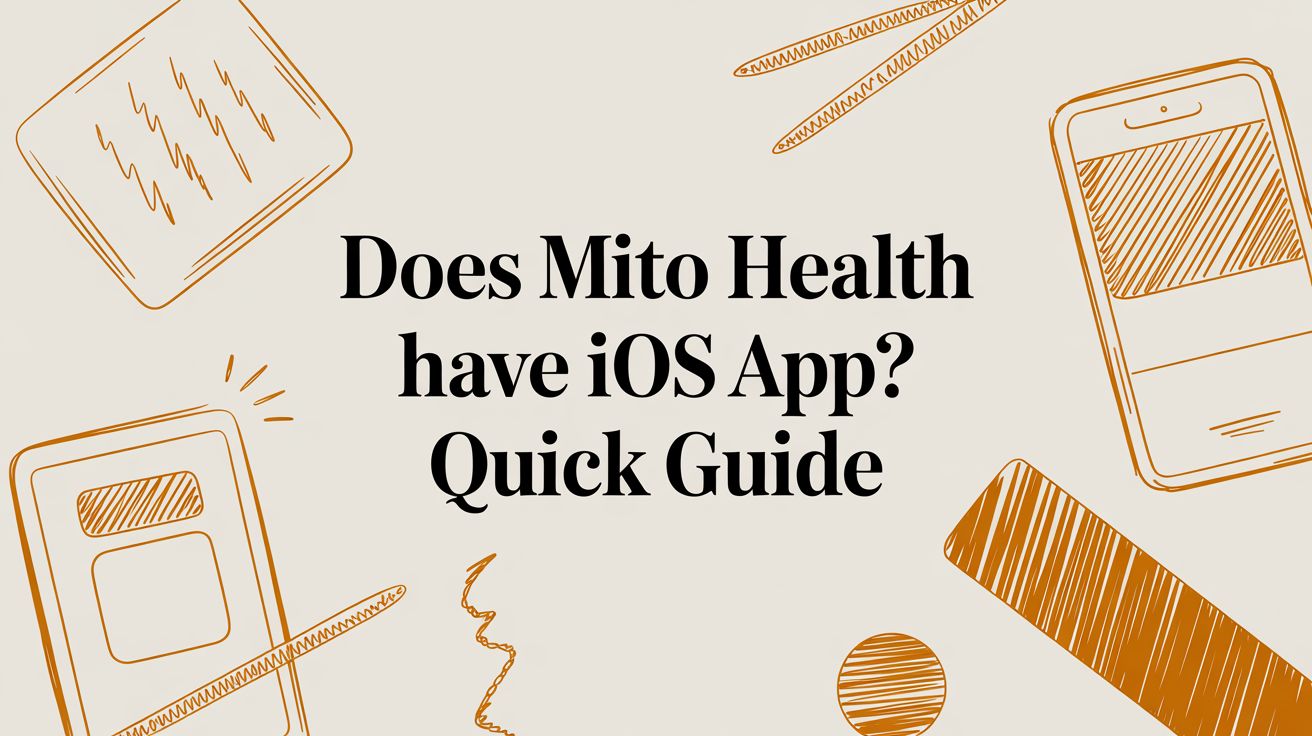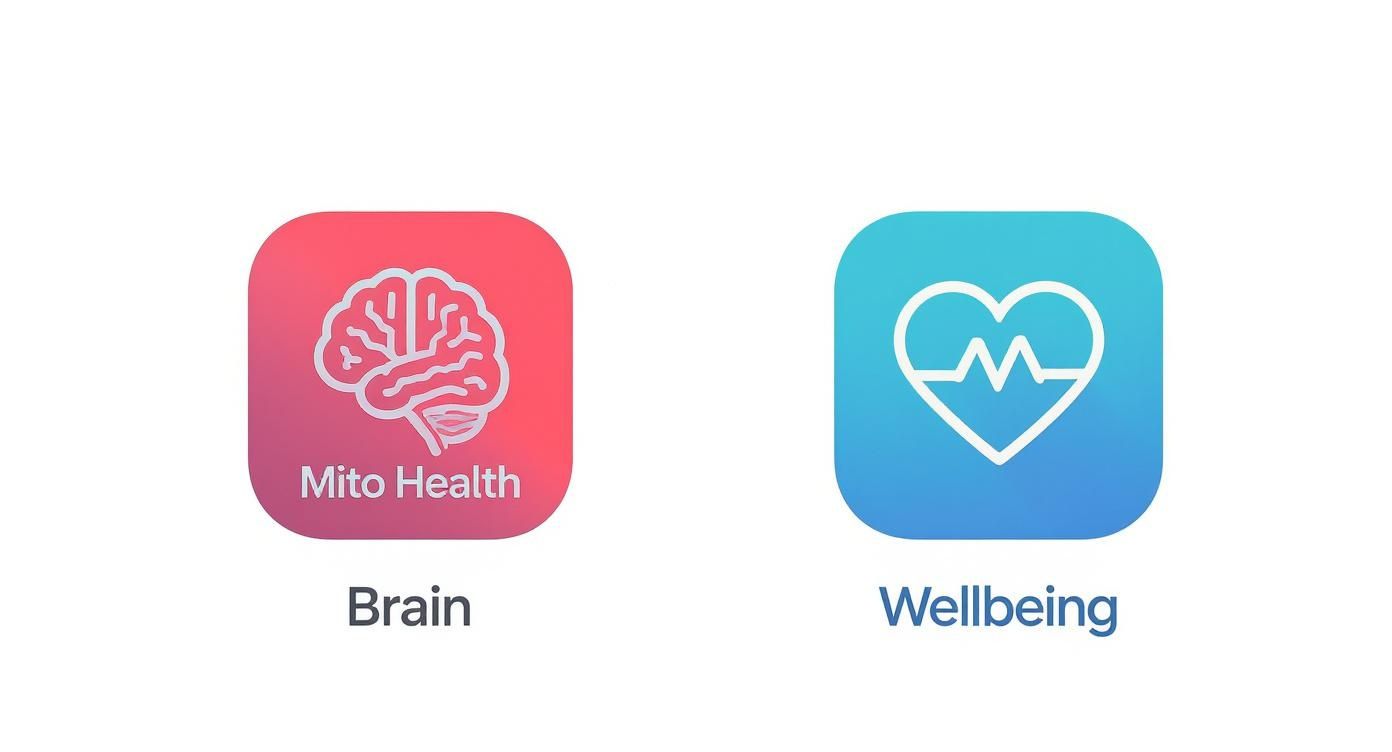does mito health have ios app? Get a quick answer on availability and how to use Mito Health, plus top iPhone app alternatives.

It's a common question, and the answer is refreshingly simple: Mito Health does not have a dedicated iOS app available in the App Store right now.
Instead of an app, the health tech startup has put all its energy into a powerful, web-based platform. This means you can get all your personalized health insights and biomarker analysis straight from your web browser, whether you're on an iPhone, iPad, or your laptop.
Mito Health, the Singapore-based startup, made a strategic choice to build its service around a comprehensive web dashboard. So, instead of heading to the App Store, users simply log in to the mobile-friendly website to access their personalized health plans.
This "web-first" model actually comes with a few neat perks for users:
For anyone wondering if they took a different route for Android users, we cover that in our guide on whether Mito Health has an Android app.
Ultimately, this decision was about centralizing your data and creating a single, robust place for you to manage your health journey. The experience is fully optimized for mobile browsers, so checking your insights on the go is still super convenient.
Disclaimer: This article is for informational purposes only and is not a substitute for professional medical advice. Always consult with a qualified healthcare provider before making any changes to your lifestyle, diet, or medication.
So, we've established the answer to "does Mito Health have an iOS app?" is no. But that doesn't mean you're left out. Your iPhone's web browser is your direct line to the platform, and the good news is the experience is designed specifically for mobile use. You can easily manage your health data on the go without downloading a thing.
Getting to your dashboard is as simple as it gets. Just open Safari (or whichever browser you prefer), head to the Mito Health website, and log in. You'll find a clean, user-friendly interface that works perfectly on a smaller screen, letting you view biomarker results, track your progress, and read personalized insights without any hassle.
Even though it's not a native app, the web platform delivers all the core functions you'd expect. Here’s a quick rundown of how to get around on your iPhone:
A Quick Tip: For an experience that feels like an app, you can add a shortcut to the Mito Health site right on your iPhone's home screen. In Safari, just tap the 'Share' icon and then 'Add to Home Screen'. This creates a handy one-tap link directly to your dashboard.
This mobile-first web design ensures you have powerful tools right at your fingertips, even without an official iOS app. Knowing your way around is the first step to truly making the most of your health data.
Disclaimer: This article is for informational purposes only and is not a substitute for professional medical advice. Always consult with a qualified healthcare provider before making any lifestyle or medication changes.
If you head to the iOS App Store and search for "Mito Health," you might see an app named "Mito" pop up and think you've found it. It’s an easy mistake to make, but that app isn't connected to the Singapore-based Mito Health we're discussing.
This bit of confusion comes down to a simple case of a shared name. The app you'll find is called "Mito: Personalised Wellbeing," and it serves a totally different purpose.
The Mito: Personalised Wellbeing app is a completely separate product from a developer called Human Edge Advisory Services Private Limited. While Mito Health focuses on deep analysis of your blood test results through its web dashboard, this iOS app is built to sync directly with your Apple HealthKit data.
Its goal is to help you track general wellness and daily health habits by pulling in information you already have stored in Apple Health. It's a legitimate health app, just not the one you're looking for if you want biomarker analysis. The services, features, and company behind it are entirely different. You can see what it's all about on its official Apple App Store page.
Key Takeaway: The "Mito: Personalised Wellbeing" app is from a different company and has nothing to do with the Singapore-based Mito Health. Knowing this saves you from downloading the wrong service and keeps you focused on the right place: the official Mito Health website.
By keeping this distinction in mind, you can avoid any mix-ups. If you're set on getting AI-driven health plans based on your bloodwork, you’ll need to stick with Mito Health's web platform. But if a native iOS app for daily health tracking is a must-have, there are plenty of great alternatives out there built for just that.
If you're an iPhone user, having a dedicated app is often a must. So, when it comes to Mito Health, you're probably asking: is there an iOS app? The short answer is no, but don't let that stop you. Several fantastic alternatives deliver powerful health and biomarker tracking right on your iPhone.
These apps give you that seamless, on-the-go access to your health data that you're looking for, focusing on everything from heart health to detailed nutrition—goals that likely brought you to Mito Health in the first place. After all, proactively managing your health is key, a point the American Heart Association consistently emphasizes in its public health guidelines.
Before we jump into the best alternatives, let's clear up a common point of confusion. You might see an app named "Mito" on the App Store, but it’s not the service you're looking for.

As you can see, Mito Health is a web service for deep biomarker analysis, while the "Mito" app is a completely unrelated wellbeing tracker.
With that cleared up, here are our top picks for a native iOS experience:
Important Note: This article is for informational purposes only and is not a substitute for professional medical advice. Always consult a healthcare provider before making any lifestyle or medication changes.
Each of these apps brings something unique to the table. For a deeper dive, take a look at our comprehensive guide on the best health tracking apps to see how they truly stack up against each other.
When you start using a health service like Mito Health, you're not just sharing your name and email. You're trusting it with deeply personal information—your heart rate, cholesterol levels, daily habits, and more. Protecting that sensitive data is a big deal.
Digital health platforms need this kind of information to give you the personalized insights you signed up for. But knowing exactly what you're sharing is the first, most important step in keeping your privacy safe.
So, what exactly are these platforms collecting? It usually breaks down into a few key areas:
This data is the engine that powers the platform's algorithms, allowing them to deliver tailored health recommendations. But it’s critical to understand how a company stores, protects, and potentially shares that information. Guidelines from the National Institutes of Health (NIH) make it clear: strong data protection is the foundation of any trustworthy health service.
A company's privacy policy is your best friend here. It tells you everything you need to know about their data practices. Look for clear language on data encryption, whether your information is ever sold to third parties, and how you can delete your account and data for good.
For a great example of transparency, you can check out HeartFit’s privacy policy to see exactly how they handle user data.
And don't forget the simple steps you can take. Taking a minute to turn on security features like two-factor authentication adds a powerful layer of protection to your account, ensuring your health journey stays private and secure.
Disclaimer: This article is for informational purposes only and is not a substitute for professional medical advice. Always consult with a qualified healthcare provider before making any changes to your lifestyle or medication.
Thinking about how Mito Health fits into your routine can bring up a few questions, especially when it comes to mobile access and how it stacks up against other tools. Let's clear up some of the common ones.
Right now, Mito Health hasn't announced any plans to build a dedicated iPhone app. Their energy is poured into making their web-based platform as powerful and reliable as possible, ensuring it works well no matter where you access it. For the latest news, your best bet is always to check their official website directly for any new developments.
Absolutely. The Mito Health website is designed to be "mobile-responsive," which is a technical way of saying it works great on your phone's browser, like Safari. It automatically adjusts to the smaller screen. While it's not a native app you download from the App Store, you can still easily pull up your dashboard, check your health plan, and see your biomarker progress right from your phone.
The biggest difference comes down to their core purpose. Think of Mito Health as the "what" and an app like HeartFit as the "how."
They really serve two different, but complementary, parts of the health journey.
Not necessarily. Security isn't really about whether it's a website or an app—it's about the security measures the company puts in place. Both reputable web platforms and mobile apps use strong encryption (like HTTPS) to keep your data safe. The key is to always make sure you're on the official, secure site. A quick glance for the little lock icon in your browser's address bar is a great habit to get into.
Disclaimer: This article is for informational purposes only and is not a substitute for professional medical advice. Always consult with a qualified healthcare provider before making any changes to your lifestyle or medication.
Ready to turn your health plan into lasting habits? HeartFit makes building a heart-healthy lifestyle simple and motivating. Start your free trial today and see how easy it can be to take control of your well-being.
https://www.heartfit.ai